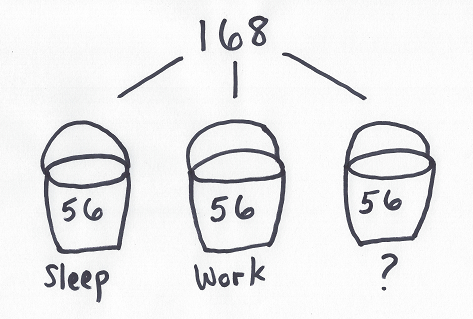
Free Smart Goal Worksheet Template
Get your free 168-hour worksheet now.
Are you constantly strapped for time? Does it seem that there are never enough hours in the day to accomplish everything you want? Do you get stressed trying to find the time to complete all the tasks on your list? If so, you are not alone. For many people, this is a recurring problem that degrades their quality of life.
Time is the most precious commodity that we have been given. Why? Because once lost, it is gone forever. We cannot borrow or buy more of it at any price. Unlike many assets, time cannot be saved for some future use. It is a finite resource that is fleeting. We really do not know how much of it we will be afforded since the future is uncertain.
Think about this: what do Warren Buffet, Bill Gates, Jeff Bezos, Oprah Winfrey, the Dalai Lama, and all of us have in common? Each one of us has 24 hours in a day and not one second more. No amount of money, fame, influence, or power can change this fact. It is the one gift that all of us have been dealt evenly and fairly. Time is the ultimate level playing field.
Let's examine time more closely: since all of us have 24 hours in a day, that equates to 168 hours per week (24 hours x 7 days). Fortunately, when we divide 168 hours by 3, we get a round number of 56 hours. Why did I divide by 3? Because our time can basically be broken down into 3 basic categories that make sense for most of us: sleep, work, and everything else.
The Three 56-Hour Time Buckets
Think of each category as a separate bucket of time. We have our sleep bucket, our work bucket, and a bucket for everything else. Most adults require 8 hours of sleep per day. This means that we spend one-third of our time (56 hours per week) sleeping, or 1 bucket.

The second bucket is allocated to work. Since most of us work at least 8 hours per day, 5 days per week, this equates to 40 hours each week. The careers of many people often demand more than 40 hours each week and also have the added burden of commute time to and from the workplace. For simplicity's sake, let's assume that most people spend one-third of their time working and commuting to work, which is 56 hours per week, or 1 bucket.
This leaves us with 1 remaining bucket of time at our disposal for everything else. It is the time we use for everyday tasks such as preparing our food, eating meals, brushing our teeth, showering, grooming, choosing what to wear, cleaning the dishes, exercising, meditating, etc. This is also the bucket of time we draw upon for leisure activities such as reading, going for a hike, watching TV or a movie, spending time with our kids, and enjoying moments with our significant other. The time in our 'everything else' bucket also gets allocated for non-everyday and occasional, yet essential, tasks such as grocery shopping, doing laundry, cleaning the house, getting our car washed, or getting an oil change, etc.
Because time is a limited commodity, and it is best managed by allocating it into these 3 buckets, it becomes imperative that we make the allocation as effective and efficient as possible. How do we manage our 168 hours most effectively?
Deciding What’s Important
In order to determine which tasks and activities are worthy of our precious time and therefore have earned allocation to one of our buckets, we need to evaluate them. Before we can perform this evaluation correctly, we need to first determine our (1) core competencies, (2) values, (3) goals, and (4) sources of happiness.
1. Core Competencies
Our core competencies are our distinguishing abilities that make us stand out from the crowd. They are the skills that we have developed that enable us to achieve our goals. They are the talents that allow us to bring the most value to what we do.
2. Values
Our values are a large part of what defines us as individuals. They help to guide our decisions, and allow us to know when we are on the right path. Our values also provide a solid foundation for our goals.
3. Goals
Our goals are the ambitions that we want to achieve in our life. They help to create a roadmap by which we travel, and work with our values to guide our decisions. Our goals should not only be looked at as targets, but also as benchmarks.
4. Happiness
Our sources of happiness are extremely personal and individual. We should not take our cues from others when deciding what makes us really happy; rather we should look deep into ourselves to discover our real sources of happiness. Knowing what truly makes us happy will make it easier for us to stop spending time on tasks and activities that don’t serve this ultimate goal in our lives.
Managing the Time Buckets
Essentially the first bucket, the sleep bucket, is fixed. For the sake of our health, we should not take any hours from that first bucket to add to the other two. So that leaves us with two buckets, or 112 hours, that we need to focus our effort on.
Let's start with our work bucket. What are the competencies that we want to focus on and develop in our work life? Which skills are we best at? Which skills do we want to develop in order to help us reach our work goals? Which activities are most aligned with our values? And which ones actually make us happy? Any tasks that do not properly align with these criteria should be outsourced or delegated wherever possible.
In my own work as a creator of this blog, the activities which are most aligned with my four criteria (competencies, values, goals and happiness) are the ones that involve researching topics, writing articles, and interacting with my readers. These (among others) are tasks which consume the 56 hours of my weekly work bucket. Other tasks, such as website design, hosting, maintaining databases, do not meet my four criteria so I delegate and outsource them. This doesn't mean these tasks are any less important; it just means that they don't belong in my own work bucket, but in someone else's.
Next let's look at our 'everything else' bucket. In the very same way, we must evaluate the tasks that we perform on a regular basis that fall into this category and determine whether they meet our four criteria. Now, not everything in this bucket will always align with all four of our criteria. For example, I don't want ironing to be one of my core competencies, but looking well groomed is one of my goals, and I feel better and happier when I present a positive image. Grocery shopping, on the other hand, is for me actually a task that meets all four of my criteria and I would never consider delegating; I know many people who disagree and would happily take it out of their own buckets.
How Do You Spend Your Time?
The reality is that most of us have no idea how we are spending our limited time and what we are actually putting into our buckets. In order to determine if you are using your own buckets as effectively as possible, I recommend a simple exercise.
Spend the next week (and preferably the next two weeks) writing down everything that you do, in as much detail as possible. The more specific and detailed you are, the more value you will get from this exercise. Take note of how much time each task you perform is really taking. I guarantee that at the end of the first day you will be surprised, and by the end of the two weeks you will be astonished by how little you know about the way you are actually spending your most precious commodity.
This may seem like a daunting exercise to complete, but its value is enormous. To make it easier to accomplish, we have created a free worksheet for you that breaks down your week from Monday through Sunday into 15 minute intervals (get your free 168-hour worksheet now). The smaller the interval, the more accurate and, therefore, the more useful your data will be. In order to help you remember to fill out your worksheet regularly, set a timer to remind you to complete it every 15 or 30 minutes; if you don't fill it out at least that often, your data's accuracy will suffer.
Get Your FREE 168-Hour Worksheet and Guide. Fill Out the Form Below to Receive Your Worksheet Now.
After filling out your worksheets for at least one whole week (remember, two weeks is really preferable), add up the hours that you spent on each task as a total. Then use your four criteria (core competencies, goals, values and happiness) to evaluate each one of those tasks. At the end of the exercise you will very likely find that you are spending a lot less time than you would like on what is most important to you, and you are in fact wasting a lot of time on things which are meaningless to you. Now what do you do with this knowledge?
How to Use Your Time Buckets Effectively
1. Be Thoughtful and Realistic
Once you have completed your worksheets and determined which activities and tasks belong in your buckets, decide how much time you ideally want to devote to each one. Remember, each bucket only gets 56 hours in a week, so allocate your hours thoughtfully, but realistically. You may have to make some sacrifices in this step; determine what you are and are not willing to compromise on.
2. Eliminate Waste
Out of the tasks that are most meaningless, determine which ones you can either eliminate or reduce and how you will do it. Let's say for example that you have determined that you spend 4 hours a week waiting in lines. By doing your banking online instead of at the branch, by ordering your postage instead of going to the post office, or by shopping at the grocery store at off hours, you maybe be able to cut those 4 hours down to just one.
3. Block Off Time Slots
Now look at your most important and meaningful tasks. Are you dedicating enough of your limited hours to them? Let's say that spending time with your children is one of your highest priorities in your 'everything else' bucket. But after completing your exercise, you find out that you are actually spending a lot less time than you want to with them. Make it a point to block off time slots on a weekly (and hopefully daily) basis that you will dedicate to them. By blocking off that time, you prevent other less meaningful tasks from encroaching on what really matters to you. Do the same with your work bucket. Those activities that are most aligned with your four criteria and which are not getting the time they deserve, also need to have dedicated time blocks.
4. Plan Ahead
Remember those occasional, yet essential tasks I mentioned earlier? Sometimes those tasks can really require you to make some drastic changes in your schedule. For example, tax season, holidays, weddings, etc. can’t be ignored, and will take up a very large amount of time which has to come from somewhere else. Plan ahead for these occasions so that you are well prepared and create as little disruption as possible for your most important daily tasks.
5. Prepare for the Unexpected
And finally here is one really useful tip. Every day you will unexpectedly find yourself in an unavoidable situation that encroaches upon your precious time. Maybe one of your coworkers is late to start a meeting, or maybe you have an unusually long wait at the doctor's office. Instead of letting these occasions take up extra space in one of your buckets, come up with a mental list of small, yet meaningful, tasks that you can complete during short unblocked intervals. Create a list of friends and relatives that you would like to email, or bookmark articles that you want to read on your phone's browser. That way you will never be caught off-guard and you will be able to turn time wasted into time well-spent.


